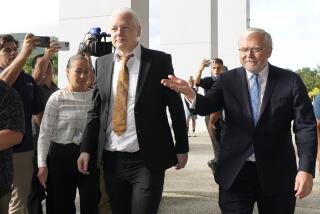Edward Snowden breaks silence to declare his mission accomplished
- Share via
Fugitive NSA leaker Edward Snowden, who had been keeping a low profile in Moscow since being granted asylum there in August, has broken out of his seclusion with a lengthy interview with the Washington Post and a recorded television address to be aired in Britain on Christmas Day.
Snowden used his first significant direct media contacts since arriving in Russia in June to portray his disclosure of secret intelligence gathering programs as a public service alerting Americans and people around the world to the risks those operations pose to individual privacy.
Since he fled his National Security Agency job in Hawaii and began leaking highly classified information, Snowden has been charged in the U.S. with felony espionage and theft of government property. But he is hailed as a hero by those who share his concerns that the massive NSA data sweeps in the name of counterterrorism unjustly intrude on the communications of innocent people.
Snowden said he realized he was “going in blind” when he sought to take public his complaints of excessive government monitoring, unsure whether the global audience would share his views.
“For me, in terms of personal satisfaction, the mission’s already accomplished,” he told the Post. “I already won. As soon as the journalists were able to work, everything that I had been trying to do was validated. Because, remember, I didn’t want to change society. I wanted to give society a chance to determine if it should change itself.”
The 30-year-old former NSA contractor insisted in two days of conversation with the Post’s Barton Gellman in Moscow that neither China nor Russia -- the two countries to which he fled after leaking details of NSA surveillance -- could have obtained his cache of stolen intelligence.
Snowden declined to discuss the whereabouts of the purloined files, the Post said, “but he said that he is confident he did not expose them to Chinese intelligence in Hong Kong. And he said he did not bring them to Russia.”
Snowden also denied having “loyalties to Russia or China or any country other than the United States.” He said he has “no relationship with the Russian government,” which has given him asylum on condition he cease leaking information that is damaging to the Kremlin’s “American partners.”
“If I defected at all,” Snowden is quoted as saying by the Post, “I defected from the government to the public.”
Gellman said Snowden seldom veered into his personal life during their 14 hours of discussion other than to say he mostly stays in his apartment surfing the Internet and communicating with friends. The fugitive said he survives mostly on ramen noodles and chips, and described himself as “an indoor cat.”
In the Christmas Day message he recorded for Britain’s Channel 4, an alternative to the BBC’s televised holiday address by Queen Elizabeth II, Snowden expanded on his intentions in leaking classified NSA information, Britain’s Guardian newspaper reported.
“A child born today will grow up with no conception of privacy at all. They’ll never know what it means to have a private moment to themselves, an unrecorded, unanalyzed thought,” Snowden says in the address taped in Moscow to be broadcast at 4:15 p.m. London time on Christmas Day.
“The conversation occurring today will determine the amount of trust we can place both in the technology that surrounds us and the government that regulates it,” Snowden says in a segment of the address released to the Guardian on Tuesday. “Together we can find a better balance, end mass surveillance and remind the government that if it really wants to know how we feel, asking is always cheaper than spying.”
The Guardian said Snowden’s address was filmed in Russia by American documentary filmmaker Laura Poitras. The Guardian’s Glenn Greenwald, the Post’s Gellman and Poitras have been conduits for Snowden’s NSA disclosures.
Channel 4 has been broadcasting an “alternative” to the queen’s Christmas Day address for the past 20 years, often giving a platform for a quirky or controversial figure. Then-Iranian President Mahmoud Ahmadinejad gave the address in 2008, and Marge, the fictional mother on “The Simpsons,” appeared in 2004.
Snowden refers in his turn in the television spotlight to George Orwell, the early-20th century British author of the classic dystopian novel “1984” about government surveillance and control run amok.
“The types of collection in the book -- microphones and video cameras, TVs that watch us -- are nothing compared to what we have available today,” Snowden says of the NSA’s spying techniques. “We have sensors in our pockets that track us everywhere we go. Think about what this means for the privacy of the average person.”
Twitter: @cjwilliamslat
More to Read
Sign up for Essential California
The most important California stories and recommendations in your inbox every morning.
You may occasionally receive promotional content from the Los Angeles Times.











